新概念英语第一册L67-68教案讲课教案
新概念第一册第67课

am/is-was, go-went, eat-ate, buy-bought, think-thought teach-taught, hurt-hurt, win-won,
is-was, are-were,
do-did
swim-swam,
bring-brought,
16
时态复习
一般现在时: (lesson 47,55,57) Father usually goes to work in the
morning. Father does not usually go to work in the
morning. Does father usually go to work in the
Lucy was at the office on Tuesday. Was Lucy at the office on Tuesday?
28
29
30
31
一般过去时的否定
主谓宾结构: 主语+did not/ didn’t+ 谓语+宾语 We didn’t cook this morning. He didn’t cook this morning. 对比一下: 一般现在时的否定: We don’t cook in the morning. He doesn’t cook in the morning.
33
33
一般过去时的否定
主系表结构: They were in the garden on Sunday. They were not in the garden on Sunday.
He was absent from school on Monday. He was not absent from school on
新概念英语NCE1_lesson67-68(共17页)课件

❖ (2)介词on用于周和月份中的任何一天 之前。
❖ 通常使用介词 on表示星期几(如 on Monday在星期一)、一天中的某段时间 (如 on Monday morning在星期一早上)、 日期(如 on April 1st在4月1日)、星期几 +日期(如 on Monday,April 1st在4月1日, 星期一)、具体时间(如 on that day在那 一天)、周年纪念日(如 on your birthday 在你的生日)以及节日(如 on Christmas Day在圣诞节)等。
Lesson 68 what’s the time ?
New Words
church 教堂 dairy 乳品店 baker 面包师傅 grocer 食品杂货店
Key structures
-Where were you on Monday? -I was in GZ.
-When were you at the office? -9:00 pm last night.
was is
(He, She, It)
第二人称单数,复数 are were
(You)
Exercise
❖ 他们昨天在北京。 ❖ 他去年还是个学生。 ❖ 你昨晚在家吗? ❖ 你们上午在哪儿?
用介词at, on和in的时间短语
❖ (1)用介词 at的时间短语通常可表示:确切的时间(如 at 10 o' clock 10点钟时),用餐时间(如 at lunchtime午餐 时),其他时刻(如 at noon中午时),年龄(如 at the age of 27 27岁时)等。
新概念第一册67-68课课件

新概念第一册6768课课件大纲
汇报人:
目 录 CTLOG
01
单击此处 添加目录标题
04
课程内容讲解
02
课件概览
03
课程重点与难点
05
课程练习与巩固
06
课程总结与回顾Байду номын сангаас
01
添加章节标题
02
课件概览
课件封面 标题:新概念第 一册67-68课课件 大纲
作者:XXX
副标题:课件 概览
逐句进行中英文 对照翻译
强调常用词汇与 表达方式
结合例句说明语 言点
课文段落解析与总结
段落大意概括: 每段课文的内
容简述
重点词汇解释: 课文中出现的 生词和难词的
详细解释
语法结构分析: 对课文中的复 杂句型和语法
的讲解
课文主题思想: 对课文整体内 容的理解和总
结
05
课程练习与巩固
词汇练习
词汇练习的形式包括单词拼 写、词义匹配、选词填空等。
课文重点词汇与短语讲解
重点词汇:掌握课文中的重点词汇包括发音、拼写和用法。 短语讲解:深入理解课文中的常用短语包括意思、用法和例句。 词汇拓展:根据课文内容拓展相关词汇和短语帮助学生扩大词汇量。
练习巩固:设计相关练习题帮助学生巩固所学词汇和短语提高记忆和应用能力。
课文句子解析与翻译
解析重点句子结 构与含义
能够正确地使用这些词汇和短语进行口头和书面表达并能够理解含有这些词汇和短语的句子和段落。
通过练习和活动加深对这些重点词汇和短语的记忆和理解提高语言应用能力。
难点解析与练习
难点解析:讲解课文中的复杂语法点和难点词汇 帮助学生更好地理解课文。
Lesson67-68(课件)新概念英语第一册

1. 一般现在时 经常的状态 主语 + is/am/are +非动词 习惯的动作 主语 + 动词(原型/三单) 真理
一般过去时 过去经常的状态 主语 + was(is/am)/were +非动词 过去习惯的动作 主语 + 动词过去式
2. How’s Jimmy today? ’s = is/was/has
/
Where were you on...? (Sunday, January 1st) ...你在什么地方? I was at..., on...
When were you at ...? 你什么时候在......? I was at....,on...
书面练习B Examples: he/church/Sunday When was he at church? He was at church on Sunday.
6. weekend /'wi:kend/ n. 周末 week + end
7. country /kʌntri/ n. 乡村 - countries in the country in the city 在城里 in the village 在村里 in the town 在城镇
8. lucky /'lʌki/ adj. 幸运的 luck n. 运气 不可数 Good luck! 祝好运! You are so lucky! You are a lucky dog! 幸运儿
新概念Lesson 67&68
By Gaby
课文笔记复习+作业讲解:
1. greengrocer /'gri:n'grəusə/ n. 蔬菜水果零售商 at the greengrocer’s (shop) 在蔬菜水果零售店 at the butcher’s (shop) 在肉店 at the hairdresser’s (shop) 在理发店 at the stationer’s (shop) 在文具店 at the doctor’s (office) 在诊所 at my father’s (house) 在我父亲家
新概念英语第一册L67-68教案
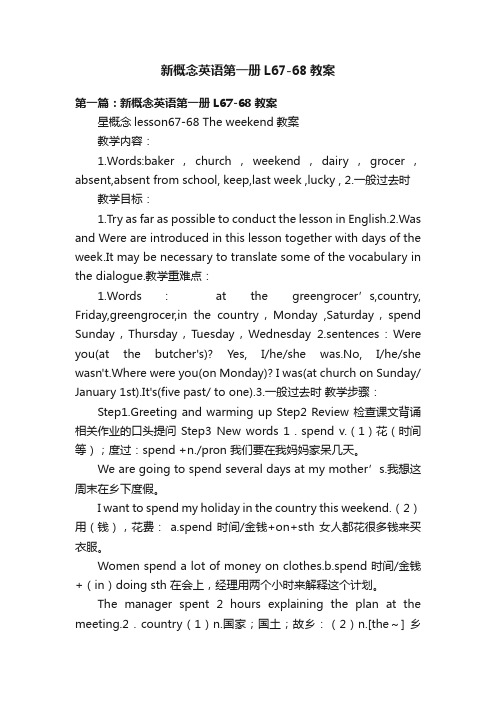
新概念英语第一册L67-68教案第一篇:新概念英语第一册L67-68教案星概念lesson67-68 The weekend教案教学内容:1.Words:baker,church,weekend,dairy,grocer,absent,absent from school, keep,last week ,lucky ,2.一般过去时教学目标:1.Try as far as possible to conduct the lesson in English.2.Was and Were are introduced in this lesson together with days of the week.It may be necessary to translate some of the vocabulary in the dialogue.教学重难点:1.Words:at the greengrocer’s,country, Friday,greengrocer,in the country,Monday ,Saturday,spend Sunday,Thursday,Tuesday,Wednesday2.sentences:Were you(at the butcher's)? Yes, I/he/she was.No, I/he/she wasn't.Where were you(on Monday)? I was(at church on Sunday/ January 1st).It's(five past/ to one).3.一般过去时教学步骤:Step1.Greeting and warming up Step2 Review 检查课文背诵相关作业的口头提问Step3 New words 1.spend v.(1)花(时间等);度过:spend +n./pron 我们要在我妈妈家呆几天。
新概念英语第一册第67-68课课件 Liya

✿肯定句:主语 + was (were) + …。
e.g. ① I was late yesterday. 昨天我迟到了。
②You were happy when you were at school. 当你在学校, 你很开心。 ③He was a farmer six years ago. 他六年前是一名农民。 ④My friends were so sad. 我的朋友们很伤心。 teachers.
✲ last
week:上周
(2)She was absent from the meeting. ✲ on:表示在星期几用介词on。 ✲ and连接几个词语时, and前升调,后降调。 ✲ all 是代词,表示“所有”。
★ MRS.WILLIAMS: Yes, he was. He was absent on Monday, Tuesday, Wednesday and Tuesday. How are you all keeping? ✲ = How are you ? 用来指3个或3个以上的人和事物。
Were you late yesterday? 你昨天迟到了吗?
②You were happy when you were at school. 当你在学校, 你很开心。
Were you happy when you were at school? 你在学校开心吗?
③He was a farmer six years ago. 他六年前是一名农民。
(2)spend time/money on something ✲ for the weekend: 整个周末这几天 在…方面时间/花钱 e.g. I spend 10 yuan for the weekend. 的时间。 on this book.
新概念英语第一册第67-68课课件
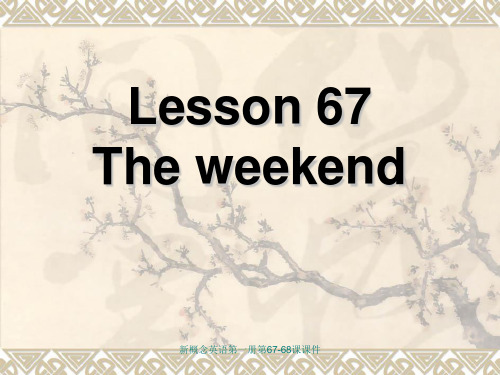
e.g. 1、Mrs. Peter always carried an umbrella. 彼得太太过去老是带着一把伞
2、I was late yesterday. 昨天我迟到了。
3、When she was a teacher, she was very strict. 当她以前是一名老师时,她很严厉。
♣ MRS.JOHNSON:
Very well, thank you. ✲ very well: 身体好。
✲ 主语 + be动词 + going to + 动原:某人/物将要做某事。 We're going to spend three days ✲ spend:花费
✲ country: 当乡村时,前面要加定冠词the;
肯定回答:Yes,主语 was新/w概e念r英e语. 第否一定册第回67答-68:课课N件o, 主语 wasn’t/weren’t.
He was a boy many years ago. He is a singer now.
新概念英语第一册第67-68课课件
❖ She was a girl many years ago.
Lesson 67 The weekend
新概念英语第一册第67-68课课件
Discussion
What did you do on weekend ?
新概念英语第一册第67-68课课件
New Words
greengrocer 蔬菜水果零售商
absent
缺席的
keep
处于、保持
spend
度过
weekend 周末
✲ well是形容词,表示身体好;
★ MRS.WILLIAMS: He's very well, She is well.
新概念一L67-68ppt课件
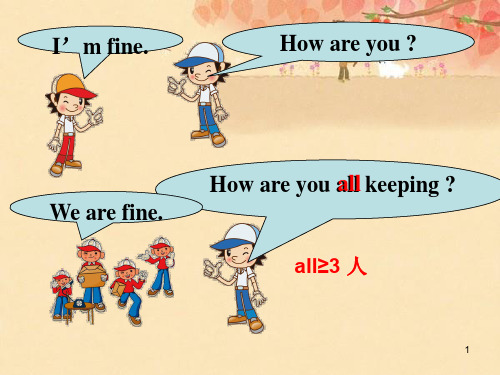
We are going tospend three days in the country . We are going to stay at my mother’sfor weekend
the
.
Saturday
MRS. WILLIAAMreSn:’Ftridaluy,cky
and Sunday in
you _w_e_r_e_, we_w__er_e_, they w__e_re__ _w__e_re_
25
1. I was at the butcher’s.
否:I w__a_s_n__ot at the butcher’s. 疑:W=ewreasyno’utat the butcher’s?
2. We were at the greengrocer’s.
16
综合篇
MRS. JOHNSON: Hello.Were you at thebutcher’?s MRS. WILLIAMS: Yes, I was.
Were you at the butcher’s,too ? MRS. JOHNSON: No, I wasn’t. I was at the greengrocer’sH. ow’s Jimmy today? MRS. WILLIAMS: He’s verywell , thank you. MRS. JOHNSON: Was he absent from school last
We are going to spend three days in the country. We are going to stay at my mother’s for the
weekend.
MRS. WILALIrAeMn’S:t Friday, Saturday and Sunday in the
新概念英语NCE1_lesson67-68(共33页)课件

were的否定weren’t
was 的否定 wasn’t
• How is Jimmy today? • How are you? How is she/he? • How are they?
•
How are you all keeping?问人怎么
样? 也可以说How are you doing?
名词性…的 反身代词
mine
myself
his
himself
hers
herself
its
itself
ours
ourselves
theirs
theirselves
yours
yourselves
New words
• Monday 星期一 • Tuesday 星期二 • Wednesday 星期三 • Thursady 星期四 • Friday 星期五 • Saturday 星期六 • Sunday 星期日
• He was absent in Monday,Tuesday,
Wednesday ,and thurday. from
• We are going to spent three days on the
country. spend
in
• Aren’t you luck!
lucky
Monday Tuesday Wednesday Thursday Friday Saturday Sunday
• How is everything/it going?
•
What’s going on?
那一般我们都怎么回答呢?
• Not bad. • Pretty well. Very well. • Great. • I’m OK.
新概念英语第一册第67-68课课件
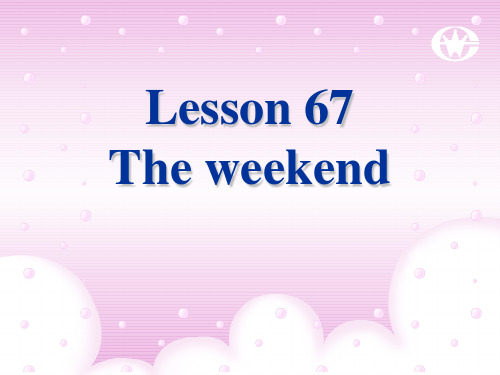
be动词的过去式
主语/时态 第一人称单数 ( I) 第三人称单数 (He, She, It) 第二人称单,复数 (You)第一人称、第三人 称复数we/they 现在时 am was is are were 过去时
is------isn’t
am-------am
not are-------aren’t
= How are you ? 用介词on。 keep v. (身体健康)处于(状况)
♣ MRS.JOHNSON:Very well, thank you. We're going to spend
three daysin the country. We're going to stay at my mother's for the weekend. stay: 短暂的居住。 for the weekend: 整个周末这几天 的时间。 at the weekend 强调时间的某一点
✲ well是形容词,表示身体好
♣ MRS.JOHNSON: Was he absent from school last week? last:上一个 week:周 last week:上周
★ MRS.WILLIAMS: Yes, he was. He was absent on Monday, Tuesday, Wednesday and Tuesday. on:表示在星期几 How are you all keeping?
find out: 有了什么,什么有变化 yesterday am----->was is------->was are------>were
一般过去时
定义:表示过去某个时间发生的动作或者存在
新概念英语第一册L67-68教案
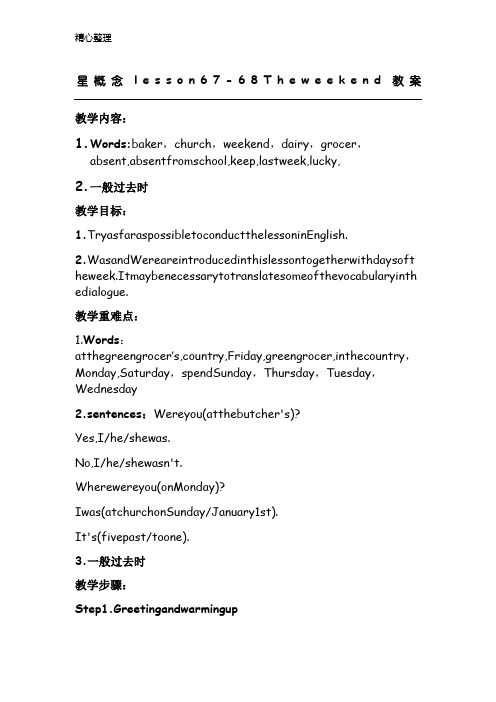
星概念l e s s o n67-68T h e w e e k e n d教案教学内容:1.W ords:baker,church,weekend,dairy,grocer,absent,absentfromschool,keep,lastweek,lucky,2.一般过去时It's(fivepast/toone).3.一般过去时教学步骤:Step1.GreetingandwarmingupStep2Review检查课文背诵相关作业的口头提问Step3Newwords1.spendv.(1)花(时间等);度过:spend+n./pron我们要在我妈妈家呆几天。
1.IntroducethestoryT:Todaywe’lllistentoastoryaboutMrsWilliamsandMrs.Johnson.2.UnderstandthesituationAskthestudentstointerpretthepictures3.Askandanswerthequestions(Lookatthepictures):a.T:WasMrs.Johnsonatthebutcher’s?S:No,shewasn’t.b.T:Wassheatthegreengrocer’s?S:Yes,shewas.c.T:Whowasatthebutcher’s?S:Mrs.Williamswas.d.T:Whowasatthegreengrocer’s?S:Mrs.Johnsonwas.b.atthebutcher's=atthebutcher'sshop。
在英文中,表示店铺、住宅、公共机构、公共建筑物以及教堂的名字或某人家时,名词所有格后常不出现它所修饰的名词:thegreengrocer's(shop)蔬菜水果店thehairdresser's(shop)理发店thestationer's(shop)文具店thedoctor's(office)诊所mymother's(house)我妈妈家里St.Paul's(Church)圣保罗教堂c.beabsentfrom…不在,缺席beabsentfromschool/work他情况用were。
新概念英语NCE1_lesson67-68(共24页)课件

Wednesday ,and thurday. from
• We are going to spent three days on the
country. spend
in
• Aren’t you luck!
lucky
Monday Tuesday Wednesday Thursday Friday Saturday Sunday
• We are going to stay at my mother’s for the weekend.
• Mrs.Williams:Friday,Saturday and Sunday in the country! Aren’t you lucky!
Find out the mistakes
• Was you at the butcher’s?
were
• Yes,I were. was
• How are Jimmy today? is
• Was he absent to school last week? from
• How are you all keep? keeping
• He was absent in Monday,Tuesday,
主格 I he she it we they you
宾格 me him her it us them you
…的 my
his her its our their your
新概念一Lesson67-68讲义doc
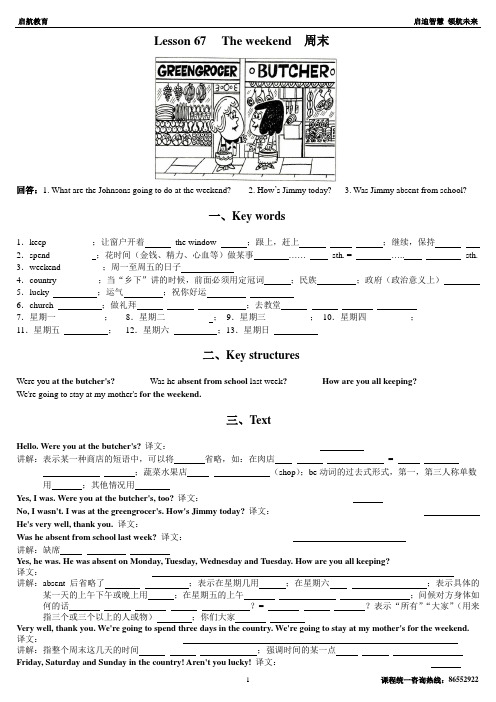
Lesson 67 The weekend 周末回答:1. What are the Johnsons going to do at the weekend? 2. How’s Jimmy today? 3. Was Jimmy absent from school?一、Key words1.keep __________;让窗户开着the window ;跟上,赶上;继续,保持2.spend _________ ;花时间(金钱、精力、心血等)做某事……sth. = ….. sth. 3.weekend _________;周一至周五的日子4.country _________;当“乡下”讲的时候,前面必须用定冠词;民族;政府(政治意义上)5.lucky ;运气;祝你好运6.church ;做礼拜;去教堂7.星期一__________;8.星期二_________ ;9.星期三_________;10.星期四_________;11.星期五;12.星期六;13.星期日二、Key structuresWere you at the butcher's?Was he absent from school last week? How are you all keeping?We're going to stay at my mother's for the weekend.三、TextHello. Were you at the butcher's?译文:__________________________________讲解:表示某一种商店的短语中,可以将省略,如:在肉店=;蔬菜水果店(shop);be动词的过去式形式,第一,第三人称单数用;其他情况用Yes, I was. Were you at the butcher's, too?译文:__________________________________No, I wasn't. I was at the greengrocer's. How's Jimmy today?译文:__________________________________He's very well, thank you. 译文:__________________________________Was he absent from school last week? 译文:________________________讲解:缺席Yes, he was. He was absent on Monday, Tuesday, Wednesday and Tuesday. How are you all keeping?译文:_________________________讲解:absent 后省略了;表示在星期几用;在星期六;表示具体的某一天的上午下午或晚上用;在星期五的上午;问候对方身体如何的话?= ?表示“所有”“大家”(用来指三个或三个以上的人或物);你们大家Very well, thank you. We're going to spend three days in the country. We're going to stay at my mother's for the weekend. 译文:________________________________讲解:指整个周末这几天的时间;强调时间的某一点Friday, Saturday and Sunday in the country! Aren't you lucky!译文:__________________________________讲解:否定疑问句形式的感叹句 ,为的是加强语气,尽管形式上是否定的,但却表示强有力的肯定。
最新新概念第一册教案-67-68

新概念第一册教案67-68课教案教材及进度NCE1 Lesson 67 The weekend 周末时长2小时Teaching aims and demands. *Try as far as possible to conduct the lesson in English.*Note the use of the simple present with seasons, climate, and countries.Frequency adverbs are used after the verb be.Teaching important anddifficult points. 新单词:baker 面包师church 教堂dairy 乳品店grocer 食品杂货商重难点单词:absent 缺席的absent from school 没有上学at the greengrocer 在蔬菜水果零售商店里country 乡村Friday 星期五greengrocer 蔬菜水果零售商in the country 在乡下keep 处于(状况)last week 上周lucky 幸运的Monday 星期一Saturday 星期六spend 度过Sunday 星期天Thursday 星期四Tuesday 星期二Wednesday 星期三weekend 周末重难点句型:Were you (at the butcher's)?Yes, I/he/she was.No, I/he/she wasn't.Where were you (on Monday)?I was(at church on Sunday/ January 1st).It's(five past/ to one).Teaching materials. Book,notebook,exercise book。
Knowledge expansion. 课文详注Further notes on the text1.Were you at the butcher's? 刚才您在肉店里吗?at the butcher's = at the butcher's shop。
新概念英语第一册Lesson 67&68课件
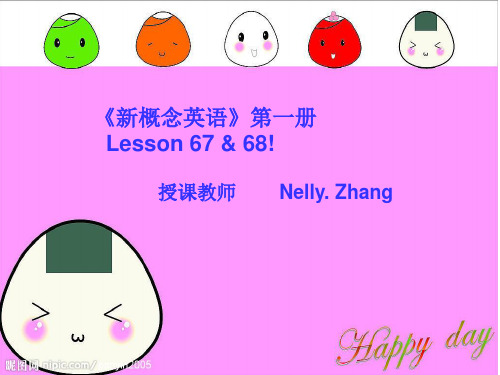
Sunday, January 1st Where was she on…? When was she at church?
at the baker’s
Friday, June 6th Where was she on…? When was she at the baker’s?
Pari work:Ask and answer!
When was Jimmy absent from shcool? He was absent from school on Monday, Tuesday,Wednesday and Thursday. How many days are the Johnsons going to say in the country? They are going to stay there for three days.
现在已经结束的动作。本课学习了带有be动词的一 般过去时。本时态常和有明确表示过去的时间连用。
1.肯定句结构:主语+was/were+...,第一, 第三人称的过去时(am/is)要变为was。 其余的都用were。 was/were 2. 一般疑问句:________提前,其余不 变。 肯定回答:Yes,主语+was/were. 否定回答:No, 主语+wasn't/weren't. not was/were 3.否定句在_________后加______,其余 不变。
Can you retell it?
Homework!
1. Retell the dialogue. 2. Finish the related exercise. 3. Learn the new words by heart.
新概念英语Lesson 67-68讲义
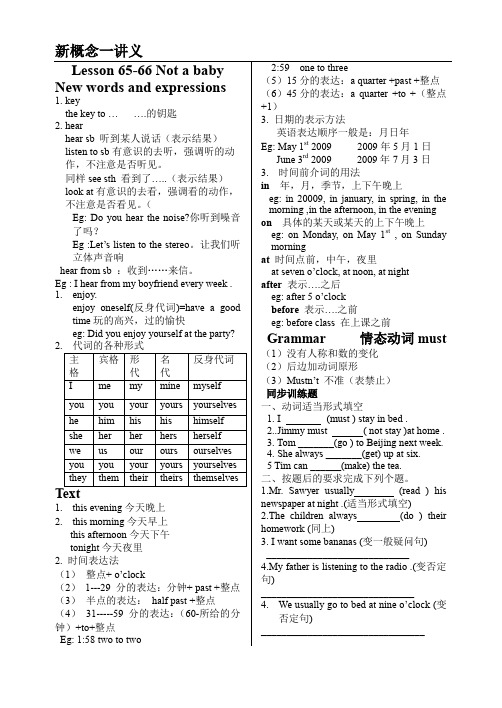
新概念一讲义Lesson 65-66 Not a baby New words and expressions 1. keythe key to …….的钥匙2. hearhear sb 听到某人说话(表示结果)listen to sb有意识的去听,强调听的动作,不注意是否听见。
同样see sth 看到了…..(表示结果)look at有意识的去看,强调看的动作,不注意是否看见。
(Eg: Do you hear the noise?你听到噪音了吗?Eg :Let’s listen to the stereo。
让我们听立体声音响hear from sb :收到……来信。
Eg : I hear from my boyfriend every week .1.enjoy.enjoy oneself(反身代词)=have a good time玩的高兴,过的愉快eg: Did you enjoy yourself at the party?2.代词的各种形式主格宾格形代名代反身代词I me my mine myselfyou you your yours yourselves he him his his himselfshe her her hers herselfwe us our ours ourselvesyou you your yours yourselves they them their theirs themselves Text1.this evening今天晚上2.this morning今天早上this afternoon今天下午tonight今天夜里2. 时间表达法(1)整点+ o’clock(2)1---29 分的表达:分钟+ past +整点(3)半点的表达:half past +整点(4)31-----59分的表达:(60-所给的分钟)+to+整点Eg: 1:58 two to two2:59 one to three(5)15分的表达:a quarter +past +整点(6)45分的表达:a quarter +to +(整点+1)3. 日期的表示方法英语表达顺序一般是:月日年Eg: May 1st 2009 2009年5月1日June 3rd 2009 2009年7月3日3.时间前介词的用法in年,月,季节,上下午晚上eg: in 20009, in january, in spring, in the morning ,in the afternoon, in the evening on具体的某天或某天的上下午晚上eg: on Monday, on May 1st, on Sunday morningat时间点前,中午,夜里at seven o’clock, at noon, at nightafter表示….之后eg: after 5 o’clockbefore 表示….之前eg: before class 在上课之前Grammar 情态动词must (1)没有人称和数的变化(2)后边加动词原形(3)Mustn’t 不准(表禁止)同步训练题一、动词适当形式填空1. I (must ) stay in bed .2..Jimmy must ( not stay )at home .3. Tom _______(go ) to Beijing next week.4. She always _______(get) up at six.5 Tim can ______(make) the tea.二、按题后的要求完成下列个题。
- 1、下载文档前请自行甄别文档内容的完整性,平台不提供额外的编辑、内容补充、找答案等附加服务。
- 2、"仅部分预览"的文档,不可在线预览部分如存在完整性等问题,可反馈申请退款(可完整预览的文档不适用该条件!)。
- 3、如文档侵犯您的权益,请联系客服反馈,我们会尽快为您处理(人工客服工作时间:9:00-18:30)。
新概念英语第一册L67-68教案
星概念lesson67-68 The weekend教案
教学内容:
1.W ords:baker ,church, weekend, dairy ,grocer ,absent,absent from school, keep,last week ,lucky ,
2.一般过去时
教学目标:
1.Try as far as possible to conduct the lesson in English.
2.Was and Were are introduced in this lesson together with days of the week.It may be necessary to translate some of the vocabulary in the dialogue.
教学重难点:
1.Words: at the greengrocer’s,country, Friday,greengrocer,in the country , Monday ,Saturday,spend Sunday ,Thursday ,Tuesday, Wednesday
2.sentences:Were you (at the butcher's)?
Yes, I/he/she was.
No, I/he/she wasn't.
Where were you (on Monday)?
I was(at church on Sunday/ January 1st).
It's(five past/ to one).
3.一般过去时
教学步骤:
Step1. Greeting and warming up
Step2 Review检查课文背诵相关作业的口头提问
Step3 New words
1.spend v.
(1)花(时间等);度过:spend +n./pron
我们要在我妈妈家呆几天。
We are going to spend several days at my mother’s.
我想这周末在乡下度假。
I want to spend my holiday in the country this weekend.
(2)用(钱),花费:
a.spend 时间/金钱+on+sth
女人都花很多钱来买衣服。
Women spend a lot of money on clothes.
b.spend 时间/金钱+(in)doing sth
在会上,经理用两个小时来解释这个计划。
The manager spent 2 hours explaining the plan at the meeting. 2.country
(1)n. 国家;国土;故乡:
(2)n. [the~] 乡下,乡村:
Step4 Listening comprehension
1.Introduce the story
T:Today we’ll listen to a story about Mrs Williams
and Mrs.Johnson.
2.Understand the situation
Ask the students to interpret the pictures
3.Ask and answer the questions(Look at the pictures):
a. T:Was Mrs.Johnson at the butcher’s? S:No,she wasn’t.
b. T:Was she at the greengrocer’s? S:Yes,she was.
c. T:Who was at the butcher’s? S:Mrs.Williams was.
d. T:Who was at the greengrocer’s? S: Mrs.Johnson was.
e. T:How is Jimmy today? S:He’s very well.
f. T:Was Jimmy at school last week? S:No,he wasn’t.
g. T:When was he absent from school? S:He was absent on Monday,Tuesday,Wednessday and Thursday.
h. T:Where are the Johnsons going to spend the weekend?
S:At Mrs.Johnson’s mother’s,in the country.
4.Listen and answer the question:
T:Listen to the story and see if you can answer this question:
What are the Johnsons going to do for the weekend?
5.Answer the question:They are going to stay in the
country for the weekend.
6.Listen and repeat
7.Intensive reading
a.Were you at the butcher's? 刚才您在肉店里吗?
b.at the butcher's = at the butcher's shop。
在英文中,表
示店铺、住宅、公共机构、公共建筑物以及教堂的名字或某人家时,名词所有格后常不出现它所修饰的名词:
the greengrocer's(shop) 蔬菜水果店
the hairdresser's(shop) 理发店
the stationer's (shop) 文具店
the doctor's(office) 诊所
my mother's(house) 我妈妈家里
St. Paul's(Church) 圣保罗教堂
c. be absent from… 不在,缺席
be absent from school/work
d.the country = the countryside, 乡下。
country表示“农村”时,前面一定要加定冠词the。
8.Read loudly
(a) in chorus,
(b) in small groups,
(c) individually.
9.Role play
Ask one or two students to take parts and to read the dialogue aloud.
Step4. Practice(Lesson68)
Step6 Grammar
一般过去时(1)
be(am/is/are) 的过去式是was/were:
在英文中,过去发生的而现在已经结束的动作要用一般过去时来表示。
be动词的过去式不规则,第1人称与第3人称单数用was,其他情况用were。
用be动词的一般现在时形式的一般疑问句及特殊疑问句迄今已介绍过,其过去时形式也一样,只是动词be在形式上变为was或were。
Step6 Homework
1.背诵lesson67课文
2.默写lesson67-68词汇
3.完成课本练习lesson67-68和词汇作业
4.预习lesson69-70。
